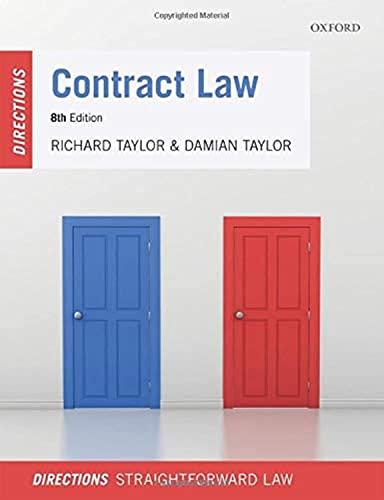Question
Consideration is one of the main elements of a contract. A contract cannot be formed without consideration. But what exactly is consideration? Consideration is NOT
Consideration is one of the main elements of a contract. A contract cannot be formed without consideration. But what exactly is consideration? Consideration is NOT about being nice or fair. Put simply, consideration is something given in exchange for a promise.Consideration is what a person will receive in return for performing a contract obligation.
William E. Story (uncle) and his nephew, William E. Story, 2d, agreed that the uncle would pay his nephew $5,000 if the nephew would refrain from drinking, using tobacco, swearing, and playing cards and billiards for money until he turned 21. There were no age restrictions at the time that would've barred Story from engaging in those activities otherwise.When the nephew turned 21, his uncle sent him a letter that indicated that the nephew had earned the $5,000 and that he would hold the money with interest until the nephew became capable of taking care of it responsibly. The nephew accepted the terms. The uncle died 12 years later without having transferred the funds to his nephew.
The nephew assigned (i.e. gave his rights to collection) the promised funds to Louisa Hamer, who brought a lawsuit against the executor of the uncle's estate, Franklin Sidway, to collect the money. Sidway (Uncle's estate executor), however, argued that the contract between Uncle and Nephew was without consideration to support it and, therefore, invalid. He asserts that the nephew, by refraining from the use of liquor and tobacco, was not harmed but benefited. He further asserts that what the nephew did was best for him to do independently of his uncle's promise and insists that it follows that unless the uncle was benefited, the contract was without consideration.
1. Is a promise to refrain from something you are LEGALLY entitled to do valid consideration?
2. (a) How would you rule if you were the judge in this case? (b) What is the reasoning for your ruling? (c) If you would rule in favor of Hamer (the person the nephew assigned his right to the funds), would you change your ruling if the nephew did NOT have the legal right to do the things he promised to not do?
Step by Step Solution
There are 3 Steps involved in it
Step: 1

Get Instant Access to Expert-Tailored Solutions
See step-by-step solutions with expert insights and AI powered tools for academic success
Step: 2

Step: 3

Ace Your Homework with AI
Get the answers you need in no time with our AI-driven, step-by-step assistance
Get Started


